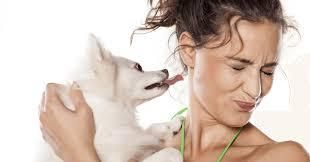Even though your dog's breath smells terrible, you should still accept his or her kisses since they are signs of affection.
A lot of pet parents may overlook bad dog breath and think it's normal. But bad breath might potentially indicate tooth issues or other major health issues.
To keep your dog healthy and their kisses at their most pleasant, here’s everything you need to know about bad breath in dogs, including why it happens, how to repair it, and how to avoid it in the first place.
What Causes Stinky Breath in Dogs?
The stinky smell coming from your pet's mouth is probably caused by one of five things.
1. Buildup of tartar and plaque
Just like humans, dogs may have plaque and tartar buildup on their teeth, too - and it’s the most prevalent reason why canines have foul breath.
Dr. Sarah Dougherty, DVM, says that the accumulation of germs on a dog’s teeth creates byproducts that contain stinking sulphur, generating the scent you may experience when your fur baby kisses your face.
Call your vet if you notice your dog has bad breath. Checking for plaque and tartar accumulation will give you an idea of how to avoid these problems in the future.
2. Gum Disease
Gum disease or periodontal disease can develop in a dog if plaque and tartar build-up on its teeth.
Plaque and tartar push gums away from their teeth, leaving the mouth vulnerable to hanging onto germs in the newly exposed regions and inflaming the gums.
In severe cases, your dog may require tooth extractions due to periodontal disease and other reasons of foul breath.
Furthermore, if you smell terrible breath coming from your dog, or if you see red or swollen gums, it's time to make an appointment with the vet.
Dr. Billmaier recommends extra vigilance with the teeth of petite, flat-faced dog breeds like Boston Terriers and French Bulldogs because of their increased susceptibility to periodontal disease as a result of their teeth being so closely spaced.
3. They Have an Object Stuck in Their Teeth
Something may have become lodged between your dog's teeth or gums, even if you take the time to wash their teeth every day.
Poor breath in dogs is often caused by a bacterial infection that develops when food or a foreign item becomes lodged in the dog's digestive tract.
Dr. Louviere recommends seeking emergency veterinary attention if you worry your dog has ingested something harmful.
The Ultimate Guide to Dog Breath Remedies
Dr. Dougherty says that the best way to treat your dog's terrible breath is to first identify the underlying cause, so it's crucial to collaborate with your vet to figure out what's making your pet's breath so rank in the first place.
If your veterinarian suspects one of the following conditions is at play, they may prescribe antibiotics or nutritional supplements to address the underlying cause and stop the disease from worsening.
Plaque and tartar accumulation, or periodontal disease, are common causes of canine foul breath, therefore your vet may recommend a professional teeth cleaning if these conditions are present.
Dr. Billmaier advises that if you want your dog's teeth properly cleaned, you can expect to have to put him under anesthesia. Consult with your veterinarian about the options available and what would be best for your dog.
Regularly Clean Your Dog's Teeth
You obviously don't want to let your own teeth go unbrushed for too long. It's suggested that dog owners clean their pup's teeth once a day to keep their mouth healthy and prevent dental problems.
The best approach to prevent plaque from forming and food from sticking to your teeth is to wash your teeth twice a day, every day.
Dog Dental Chews: A Healthy Snack for Dogs
In addition to daily tooth brushing, Dr. Dougherty recommends enzymatically coated dental chews for your dog's oral hygiene.
These treats are specially formulated to eliminate plaque from your dog's teeth, leaving them with minty fresh breath.
These chews are coated with the same sorts of enzymes that are in the toothpaste. This provides the added benefit of enzymatic breakdown of tartar and reduction of bacterial populations on the teeth, in addition to mechanical breakdown.





 StableDiffusion
StableDiffusion StableDiffusion
StableDiffusion StableDiffusion
StableDiffusion Photo by
Photo by  Photo by
Photo by  Photo by
Photo by 
 Photo by
Photo by  Photo by
Photo by  Photo by
Photo by  Photo by
Photo by  Photo by
Photo by 






